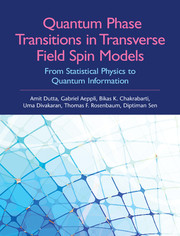 Quantum Phase Transitions in Transverse Field Spin Models
Quantum Phase Transitions in Transverse Field Spin Models Book contents
- Frontmatter
- Dedication
- Contents
- List of Figures and Tables
- Preface
- Acknowledgements
- I An Introduction to Quantum Phase Transitions, Information and Dynamics
- II Transverse Field Models: Statics
- III Transverse Field and Related Models: Non-Equilibrium Dynamics
- IV Experimental Realizations of Transverse Field Models
- V Quantum Annealing and Adiabatic Quantum Computations Using Transverse Field Models
- Appendix A Derivation of a Matrix Product Hamiltonian
- Appendix B From Jordan–Wigner to Bosonization: Tomonaga–Luttinger Liquids
- Appendix C Calculation of the Entanglement Entropy for a Transverse Ising Chain
- Appendix D The Loschmidt Echo for the One-Dimensional XY Model
- Appendix E Landau–Zener Tunneling: Calculation of Non-Adiabatic Transition Probability
- Appendix F A Note on the Theoretical Studies of Hysteresis
- References
- Index
- Plate Section
Preface
Published online by Cambridge University Press: 05 May 2015
- Frontmatter
- Dedication
- Contents
- List of Figures and Tables
- Preface
- Acknowledgements
- I An Introduction to Quantum Phase Transitions, Information and Dynamics
- II Transverse Field Models: Statics
- III Transverse Field and Related Models: Non-Equilibrium Dynamics
- IV Experimental Realizations of Transverse Field Models
- V Quantum Annealing and Adiabatic Quantum Computations Using Transverse Field Models
- Appendix A Derivation of a Matrix Product Hamiltonian
- Appendix B From Jordan–Wigner to Bosonization: Tomonaga–Luttinger Liquids
- Appendix C Calculation of the Entanglement Entropy for a Transverse Ising Chain
- Appendix D The Loschmidt Echo for the One-Dimensional XY Model
- Appendix E Landau–Zener Tunneling: Calculation of Non-Adiabatic Transition Probability
- Appendix F A Note on the Theoretical Studies of Hysteresis
- References
- Index
- Plate Section
Summary
In recent years, there has been an upsurge of studies interconnecting the phenomena of quantum phase transitions, non-equilibrium dynamics, and quantum information and computation. These studies are important from the viewpoint of fundamental physics as well as for developing new quantum technologies. This book is the first attempt to connect these different fields, mentioning both the promises and the problems and incorporating discussions of the most recent technological developments. While there are several books on quantum phase transitions, for example, those by S. Sachdev (Cambridge University Press, 2011) and S. Suzuki et al., (Springer, 2013), the present book emphasizes several different aspects not discussed in earlier books or reviews. We build up from preliminary discussions of the basic phenomenology in the introductory chapter to full exegeses of important models, with further details presented in the appendices. We hope that this structure will enable the beginner to navigate smoothly through the more involved discussions. Concise summaries at the end of each chapter should permit the reader to easily get a sense of the scope of the book.
The book describes generic theories of the scaling of quantum information theoretic measures close to a quantum critical point (QCP) and of the residual energy in the final state reached following a passage through a QCP. This non-adiabatic passage in turn generates non-trivial quantum correlations in the final state which, in some cases, are found to satisfy some intriguing scaling relations. All these theories are illustrated employing the transverse Ising and other transverse field models and their variants. The advantage of using the transverse field Ising model is two-fold: (i) the one-dimensional version with a nearest-neighbor interaction is exactly soluble (and the QCP is conformally invariant), and (ii) the model can be mapped to a classical Ising model with one added dimension using the Suzuki–Trotter or the path integral formalism. These two remarkable properties of the these models have been exploited thoroughly over the last fifty years, but especially in the last two decades to understand quantum phase transitions and their connection to information processing, non-equilibrium dynamics, and quantum annealing.
Information
- Type
- Chapter
- Information
- Quantum Phase Transitions in Transverse Field Spin ModelsFrom Statistical Physics to Quantum Information, pp. xv - xviPublisher: Cambridge University PressPrint publication year: 2015